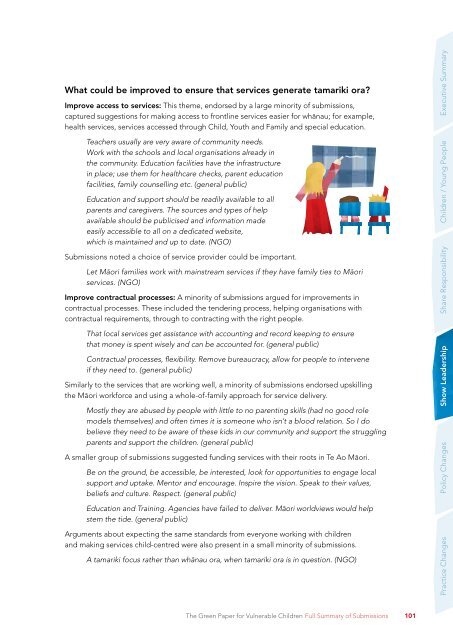The Green Paper for Vulnerable Children - Ministry of Social ...
The Green Paper for Vulnerable Children - Ministry of Social ...
The Green Paper for Vulnerable Children - Ministry of Social ...
You also want an ePaper? Increase the reach of your titles
YUMPU automatically turns print PDFs into web optimized ePapers that Google loves.
What could be improved to ensure that services generate tamariki ora?Improve access to services: This theme, endorsed by a large minority <strong>of</strong> submissions,captured suggestions <strong>for</strong> making access to frontline services easier <strong>for</strong> whānau; <strong>for</strong> example,health services, services accessed through Child, Youth and Family and special education.Teachers usually are very aware <strong>of</strong> community needs.Work with the schools and local organisations already inthe community. Education facilities have the infrastructurein place; use them <strong>for</strong> healthcare checks, parent educationfacilities, family counselling etc. (general public)Education and support should be readily available to allparents and caregivers. <strong>The</strong> sources and types <strong>of</strong> helpavailable should be publicised and in<strong>for</strong>mation madeeasily accessible to all on a dedicated website,which is maintained and up to date. (NGO)Submissions noted a choice <strong>of</strong> service provider could be important.Let Māori families work with mainstream services if they have family ties to Māoriservices. (NGO)Improve contractual processes: A minority <strong>of</strong> submissions argued <strong>for</strong> improvements incontractual processes. <strong>The</strong>se included the tendering process, helping organisations withcontractual requirements, through to contracting with the right people.That local services get assistance with accounting and record keeping to ensurethat money is spent wisely and can be accounted <strong>for</strong>. (general public)Contractual processes, flexibility. Remove bureaucracy, allow <strong>for</strong> people to interveneif they need to. (general public)Similarly to the services that are working well, a minority <strong>of</strong> submissions endorsed upskillingthe Māori work<strong>for</strong>ce and using a whole-<strong>of</strong>-family approach <strong>for</strong> service delivery.Mostly they are abused by people with little to no parenting skills (had no good rolemodels themselves) and <strong>of</strong>ten times it is someone who isn’t a blood relation. So I dobelieve they need to be aware <strong>of</strong> these kids in our community and support the strugglingparents and support the children. (general public)A smaller group <strong>of</strong> submissions suggested funding services with their roots in Te Ao Māori.Be on the ground, be accessible, be interested, look <strong>for</strong> opportunities to engage localsupport and uptake. Mentor and encourage. Inspire the vision. Speak to their values,beliefs and culture. Respect. (general public)Education and Training. Agencies have failed to deliver. Māori worldviews would helpstem the tide. (general public)Arguments about expecting the same standards from everyone working with childrenand making services child-centred were also present in a small minority <strong>of</strong> submissions.A tamariki focus rather than whānau ora, when tamariki ora is in question. (NGO)Practice Changes Policy Changes Show Leadership Share Responsibility <strong>Children</strong> / Young People Executive Summary<strong>The</strong> <strong>Green</strong> <strong>Paper</strong> <strong>for</strong> <strong>Vulnerable</strong> <strong>Children</strong> Full Summary <strong>of</strong> Submissions101
















